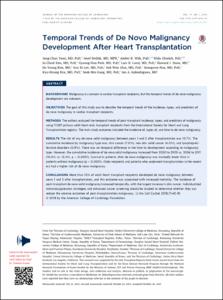KUMEL Repository
1. Journal Papers (연구논문)
1. School of Medicine (의과대학)
Dept. of Internal Medicine (내과학)
Temporal Trends of De Novo Malignancy Development After Heart Transplantation
- Affiliated Author(s)
- 김인철
- Alternative Author(s)
- Kim, In Cheol
- Journal Title
- Journal of American College of Cardiology
- ISSN
- 0735-1097
- Issued Date
- 2018
- Abstract
- BACKGROUND:
Malignancy is a concern in cardiac transplant recipients, but the temporal trends of de novo malignancy development are unknown.
OBJECTIVES:
The goal of this study was to describe the temporal trends of the incidence, types, and predictors of de novo malignancy in cardiac transplant recipients.
METHODS:
The authors analyzed the temporal trends of post-transplant incidence, types, and predictors of malignancy using 17,587 primary adult heart-only transplant recipients from the International Society for Heart and Lung Transplantation registry. The main study outcomes included the incidence of, types of, and time to de novo malignancy.
RESULTS:
The risk of any de novo solid malignancy between years 1 and 5 after transplantation was 10.7%. The cumulative incidence by malignancy type was: skin cancer (7.0%), non-skin solid cancer (4.0%), and lymphoproliferative disorders (0.9%). There was no temporal difference in the time to development according to malignancy type. However, the cumulative incidence of de novo solid malignancy increased from 2000 to 2005 vs. 2006 to 2011 (10.0% vs. 12.4%; p < 0.0001). Survival in patients after de novo malignancy was markedly lower than in patients without malignancy (p < 0.0001). Older recipients and patients who underwent transplantation in the recent era had a higher risk of de novo malignancy.
CONCLUSIONS:
More than 10% of adult heart transplant recipients developed de novo malignancy between years 1 and 5 after transplantation, and this outcome was associated with increased mortality. The incidence of post-transplant de novo solid malignancy increased temporally, with the largest increase in skin cancer. Individualized immunosuppression strategies and enhanced cancer screening should be studied to determine whether they can reduce the adverse outcomes of post-transplantation malignancy.
- Department
- Dept. of Internal Medicine (내과학)
- Publisher
- School of Medicine (의과대학)
- Citation
- Jong-Chan Youn et al. (2018). Temporal Trends of De Novo Malignancy Development After Heart Transplantation. Journal of American College of Cardiology, 71(1), 40–49. doi: 10.1016/j.jacc.2017.10.077
- Type
- Article
- ISSN
- 0735-1097
- Appears in Collections:
- 1. School of Medicine (의과대학) > Dept. of Internal Medicine (내과학)
- 파일 목록
-
-
Download
 oak-2018-1084.pdf
기타 데이터 / 1.04 MB / Adobe PDF
oak-2018-1084.pdf
기타 데이터 / 1.04 MB / Adobe PDF
-
Items in Repository are protected by copyright, with all rights reserved, unless otherwise indicated.